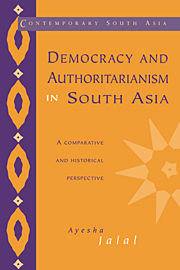Book contents
- Frontmatter
- Contents
- List of maps
- Preface
- Introduction
- 1 The colonial legacy in India and Pakistan
- 2 State formation and political processes in India and Pakistan, 1947 to c.1971
- 3 The ‘populist’ era and its aftermath in India, Pakistan and Bangladesh, 1971 to c.1993
- 4 The state and political economy, 1947 to c.1993
- 5 Central power and regional dissidence
- 6 Societies, cultures and ideologies: hybrids in contrived monoliths
- 7 Conclusion
- Bibliographical essay
- Index
6 - Societies, cultures and ideologies: hybrids in contrived monoliths
Published online by Cambridge University Press: 26 October 2009
- Frontmatter
- Contents
- List of maps
- Preface
- Introduction
- 1 The colonial legacy in India and Pakistan
- 2 State formation and political processes in India and Pakistan, 1947 to c.1971
- 3 The ‘populist’ era and its aftermath in India, Pakistan and Bangladesh, 1971 to c.1993
- 4 The state and political economy, 1947 to c.1993
- 5 Central power and regional dissidence
- 6 Societies, cultures and ideologies: hybrids in contrived monoliths
- 7 Conclusion
- Bibliographical essay
- Index
Summary
Threading the intricacies of multiple social, cultural and ideological meanings informing subcontinental South Asian states and politics is a task befitting a team of artful tapestry makers. Subcontinental societies in their varied regional and sub-regional cultural and ideological hues defy unidimensional patterning onto neat seamless folds. At each step in their historical evolution they have devised their own modes of resistance, both passive and active, to the dominant frames within which centralized states have sought to embroider a coherent national identity. Partly expressed in the dialectic of state and political processes, social dynamics at the regional and local levels also need to be decoded in terms of their own relatively autonomous, if never wholly insular, cultural and ideological idioms. Neither static nor unchanging, these represent the hybrid and improvised responses of different social formations to the centralized state's efforts at constructing and imposing monolithic cultural and ideological meanings.
The dialogue between state and societal cultural and ideological semantics waxes and wanes according to the level of political and economic incorporation of specific regions. But at no stage does it fade away to establish the omnipotence of state-sponsored symbols and meanings. Resistance to the dominant discourse promoted by the state has been an immutable feature of South Asian societies and psyches. Shaped in overlapping realms of the public and the private, these contestations have given cultural processes a certain measure of autonomy from the state, even as they are influenced by the larger political and economic context.
- Type
- Chapter
- Information
- Democracy and Authoritarianism in South AsiaA Comparative and Historical Perspective, pp. 201 - 246Publisher: Cambridge University PressPrint publication year: 1995

